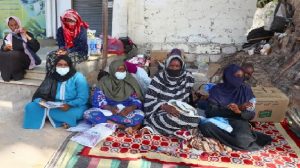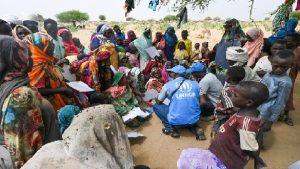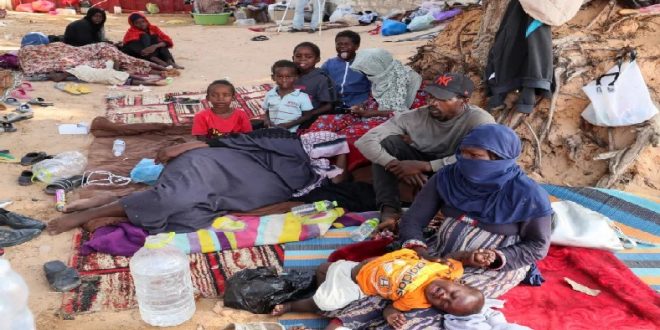07-09-2023
TRIPOLI: Outside the headquarters of the United Nations High Commissioner for Refugees (UNHCR) in the Libyan capital, Tripoli, about 150 Sudanese men, women and children have been camped out since July.
 They spend the nights out in the open, sleeping on the dry dirt as cars swish by, after a long, arduous journey from their war-torn homeland. They fled the violence hoping to find safety and a more secure future, but Libya itself is struggling, torn as it is between rival administrations and the unfettered power of rebel groups.
They spend the nights out in the open, sleeping on the dry dirt as cars swish by, after a long, arduous journey from their war-torn homeland. They fled the violence hoping to find safety and a more secure future, but Libya itself is struggling, torn as it is between rival administrations and the unfettered power of rebel groups.
The circumstances they find themselves in now are difficult. One 16-year-old boy from Ethiopia, also camped out at the UNHCR building, died on Tuesday. Activists said he needed medical help but he was ignored and left on the street.
Media contacted the UNHCR for comment but was not able to get a response.
Yet, the refugees still believe their encampment in the southwestern suburbs of Tripoli is safer than being back in Sudan.
“We fled our home fearing for our lives due to the horrendous armed clashes that erupted in our hometown in Sudan,” said Asia Abbas, a Sudanese refugee.
Asia arrived in Libya on July 5 with two of her children, the third was lost as the family was fleeing amid a hail of bullets.
 Her only glimmer of hope now is to apply for refugee status with the UNHCR. But she is not sure how her family will survive on the street as winter draws closer with its cold, rainy nights.
Her only glimmer of hope now is to apply for refugee status with the UNHCR. But she is not sure how her family will survive on the street as winter draws closer with its cold, rainy nights.
The refugees did not travel together all the way from Sudan. Some walked over the land border between Sudan and Libya. Others initially escaped to Egypt, before finding smugglers who facilitated their passage to Tripoli.
“We initially fled to Cairo, but we were left disillusioned by the UNHCR in Egypt, as they provided us with no hope of reaching a safer country where we could offer our children better lives,” another refugee, a widow with four children, told Al Jazeera.
Even before the death of the Ethiopian boy, Ya Belaadi, a Libyan NGO dedicated to supporting refugees and migrants, issued a warning over the conditions the people were living in, according to Asia Jaafer, head of the program department at Belaadi. (Int’l News Desk)
 Pressmediaofindia
Pressmediaofindia




